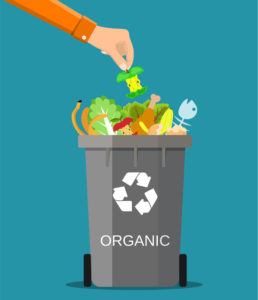It’s virtually impossible to walk through the world without absorbing some recycling messaging. By now, I think most people know that soda cans and clean paper should be tossed in a recycling bin instead of a trash can. Apples cores and leftovers,also known as organic waste, however—that’s a different story. Organics can be harmful to the environment when landfilled. Disposing of organic waste the right way is environmentally responsible for any business, and may even be legally necessary for a business located in Massachusetts.
 As businesses slowly open up and offices operate with limited capacity, this is the perfect time to review or implement your organic waste procedures. Taking the time to consider the process now will make follow through much easier when workplace attendance increases down the line.
As businesses slowly open up and offices operate with limited capacity, this is the perfect time to review or implement your organic waste procedures. Taking the time to consider the process now will make follow through much easier when workplace attendance increases down the line.
Understanding Organic Waste
Organic waste is simply any material that comes from a plant or animal and is biodegradable. Anything that you might put in a compost pile is organic waste. Examples of organic waste include:
- Leftover food.
- Coffee grounds, apple cores, egg shells and other kinds of food byproducts.
- Yard trimmings, fallen leaves, branches, pulled weeds and other landscaping debris.
- Cut flowers.
- Pet food.
- Livestock manure.
- Untreated/unpainted wood, including things like coffee stirrers and toothpicks.
- Food-stained paper/packaging, like greasy pizza boxes and used paper plates. (Note that this excludes foam and plastic food packaging, even if it’s stained with food residue.)
It’s biodegradable, so organic waste breaks down over time. This process generates a tremendous amount of methane, a potent greenhouse gas that traps heat in the atmosphere and contributes to climate change. (Methane will absorb 86 times more heat than an equal amount of carbon dioxide would over a 20-year period!) Organic waste may also contain antibiotics, chemicals and pathogens that enter the soil and groundwater as the waste breaks down.
Obviously, keeping these materials out of landfills is a matter of protecting public health. That’s why organic waste disposal must be carefully managed.
Organic Waste Disposal May Be a Matter of Law
Organic waste disposal bans have been passed in several states, as well as in certain cities. States that have organic waste bans include Massachusetts, Vermont, Connecticut and New York.
Here in Massachusetts, the Department of Environmental Protection (MassDEP) regulates the waste ban, which took effect in 2014. Any Massachusetts business that generates more than one ton of organic waste per week must comply with the regulations. These businesses may not allow their organic waste to enter the solid waste disposal stream; that is, they can’t throw it away like other garbage. MassDEP lets affected businesses decide for themselves how they will safely dispose of organic waste.
While all Massachusetts businesses are covered by the ban, restaurants, grocery stores, schools, hospitals and residential facilities are most likely to be affected. The ban is applied on a weekly basis. Maybe your business rarely handles much organic waste, except for one week each year when you have a huge company party. If you generate more than one ton of waste during that week, you must comply with the ban during that week.
Not every type of organic waste is subject to the Massachusetts organic waste ban; compostable dishes and compostable paper aren’t included, for example. Food and plant waste are the primary focus of this policy.
Handling Organic Waste
Many businesses don’t generate enough organic waste to be subject to a statewide disposal ban, but still want to dispose of these materials carefully. Composting and conversion are the most common ways to safely manage organic waste.
Composting breaks waste down until it becomes nutrient-rich fertilizer. Some businesses may have the resources and motivation to do onsite composting, though many don’t. Maintaining your own compost isn’t feasible unless you have plenty of space, staffers who are willing to turn the compost pile and a way to keep out any animals or insects that are attracted by food scraps. This isn’t an option for most businesses. Having a waste hauler collect organic waste for composting may be the better alternative.
Food waste can also be converted into energy via anaerobic digestion, or AD. In an AD facility, waste is deprived of oxygen while it breaks down, creating a renewable energy source called biogas.
So how should your business handle its organic waste? One option is to check with your local recycling agency, which may have an organics program for area businesses. Another option is to consult a waste hauler in your area. These companies are best positioned to help you comply with statewide regulations. A local waste hauler will have information about any AD facilities or commercial composting facilities in your region.
At Miller Recycling, we can help facilitate your organic waste removal. We can provide an onsite consultation to help your business establish a system for collecting and containing your organic waste, and suggest next steps for safely disposing of that waste. Contact Miller Recycling for more information.

